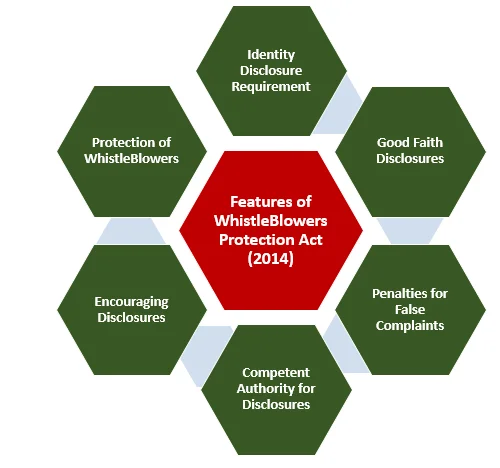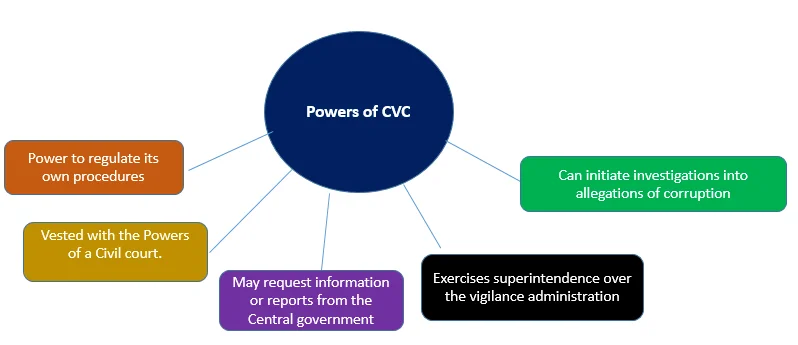The Central Vigilance Commission (CVC) is a pivotal institution in India’s fight against corruption. Established to supervise vigilance and anti-corruption activities within government agencies, the CVC operates under several key legislations. These laws empower the CVC to monitor and investigate corruption, ensuring transparency and accountability in public administration.
Central Vigilance Commission: Legislative Framework and Operational Scope
Key Legislations Pertaining to the CVC
- Prevention of Corruption Act of 1988: The Prevention of Corruption Act of 1988 grants the Central Vigilance Commission (CVC) the authority to supervise corruption investigations within government agencies.
- It holds the power to recommend cases to either the Central Vigilance Officer (CVO) in each department or to the Central Bureau of Investigation (CBI).
- CVC Act of 2003: The CVC Act of 2003 delineates the jurisdiction of the Central Vigilance Commission concerning vigilance administration.
- The Lokpal and Lokayukta Act of 2013: As per the Lokpal and Lokayukta Act of 2013, the CVC has been authorized to conduct initial inquiries into complaints forwarded by Lokpal regarding officers and officials belonging to Group A, B, C, and D services.
- Whistle-blowers Protection Act of 2014: The Whistle-blower Protection Act of 2014 is designed to safeguard the identities of whistle-blowers.
- This legislation allows individuals to make disclosures related to corruption in the public interest directly to the Central Vigilance Commission (CVC).
Enroll now for UPSC Online Course
Salient Features of the WhistleBlowers Protection Act (2014)

- Protection of WhistleBlowers: The Act establishes a mechanism to safeguard the identity of whistleblowers, individuals who expose corruption and irregularities by public servants.
- This protection ensures that those exposing corruption need not fear victimization.
- Encouraging Disclosures: The Act encourages individuals to disclose information about corruption or the misuse of power by public servants, including government officials and ministers.
- Competent Authority for Disclosures: Under the Act, individuals can make public interest disclosures about corruption to a competent authority.
- Currently, this authority is the Central Vigilance Commission (CVC).
-
-
- The government, through notification, can appoint other bodies to receive such corruption complaints.
-
- Penalties for False Complaints: The Act prescribes penalties of up to two years in prison and a fine of upto ₹30,000 for individuals who make false or frivolous complaints.
- Good Faith Disclosures: The Act stipulates that every disclosure must be made in good faith.
- The person making the disclosure must provide a personal declaration, stating that they reasonably believe the information disclosed and the allegations contained therein are substantially true.
- Disclosure Procedure: Disclosures can be made in writing or through email messages, following the prescribed procedure.
- They must contain full particulars and be supported by relevant documents and material.
- Identity Disclosure Requirement: However, no action will be taken on a disclosure if it does not reveal the identity of the complainant or the public servant.
-
-
- If the identity is found to be incorrect, the disclosure may not proceed.
-
- Exemption for Special Protection Group:
-
- The Act does not apply to the Special Protection Group.
- The WhistleBlowers Protection Act (2014) provides vital safeguards for those who expose corruption and misuse of power.
- It encourages transparency and accountability in the public sector while ensuring that whistleblowers are protected from potential harm or retaliation.
Jurisdiction of the Central Vigilance Commission (CVC)
- All India Services: The CVC has jurisdiction over members of the All India Services who are serving in connection with the affairs of the Union, as well as Group A officers of the Central Government.
- Officers in Public Sector Banks: The jurisdiction of the CVC extends to officers of the rank of Scale V and above in Public Sector Banks.
- Officers in Financial Institutions: This encompasses officers in Grade D and above in institutions like the Reserve Bank of India (RBI), NABARD, and SIDBI (Small Industries Development Bank of India).
- Executives and Officers in Public Sector Undertakings: The CVC exercises jurisdiction over Chief Executives and Executives on the Board, along with other officers of E-8 and above in Schedule ‘A’ and ‘B’ Public Sector Undertakings.
-
- Executives and Officers in Schedule ‘C’ and ‘D’ Public Sector Undertakings: CVC’s jurisdiction also includes Chief Executives and Executives on the Board, along with other officers of E-7 and above in Schedule ‘C’ and ‘D’ Public Sector Undertakings.
- Managers and Above in General Insurance Companies: CVC’s jurisdiction extends to managers and above in General Insurance Companies.
- Senior Divisional Managers and Above in Life Insurance Corporation: The jurisdiction includes Senior Divisional Managers and above in the Life Insurance Corporation.
- Officers in Central Government-Owned or Controlled Societies and Local Authorities:
-
- CVC exercises jurisdiction over officers drawing a salary of Rs. 8700 per month (pre-revised) and above, based on the Central Government D.A. pattern, which may be revised from time to time. This applies to officers in societies and local authorities owned or controlled by the Central Government.
- The Central Vigilance Commission’s jurisdiction is wide-ranging, encompassing a diverse set of categories, with the aim of ensuring vigilance, integrity, and anti-corruption measures within these entities and organizations.
Powers of the CVC

- Regulation of Procedure: The CVC has the power to regulate its own procedure to ensure effective functioning.
- Judicial Powers: CVC proceedings are characterized by their judicial nature, and the CVC is vested with the powers of a civil court.
- Information and Reports: The CVC may request information or reports from the Central government or its authorities.
- This facilitates its general supervision of vigilance and anti-corruption efforts within these entities.
- Advice and Action: Upon receiving the report of an inquiry conducted by any agency based on a reference from the CVC, the CVC provides advice to the Central government or its authorities regarding the subsequent course of action.
- Consideration of Advice: The Central government or its authorities are required to consider the advice provided by the CVC and take appropriate action.
- In cases where they disagree with the CVC’s advice, they must communicate their reasons in writing.
- Annual Reporting:
- Annual Report to the President:
-
-
-
- The CVC is obligated to present an annual report on its performance to the President.
-
-
- Presentation to Parliament:
-
-
- The President places this report before each House of Parliament, ensuring transparency and accountability in the CVC’s operations.
-
Enroll now for UPSC Online Course
| Must Read | |
| Current Affairs | Editorial Analysis |
| Upsc Notes | Upsc Blogs |
| NCERT Notes | Free Main Answer Writing |
Conclusion
The CVC’s extensive jurisdiction and powers underscore its vital role in promoting integrity within various government sectors.
- Through effective oversight and protective measures for whistleblowers, the CVC strives to uphold ethical standards in public service, contributing significantly to the country’s anti-corruption framework.
Sign up for the PWOnlyIAS Online Course by Physics Wallah and start your journey to IAS success today!

 GS Foundation
GS Foundation Optional Course
Optional Course Combo Courses
Combo Courses Degree Program
Degree Program









